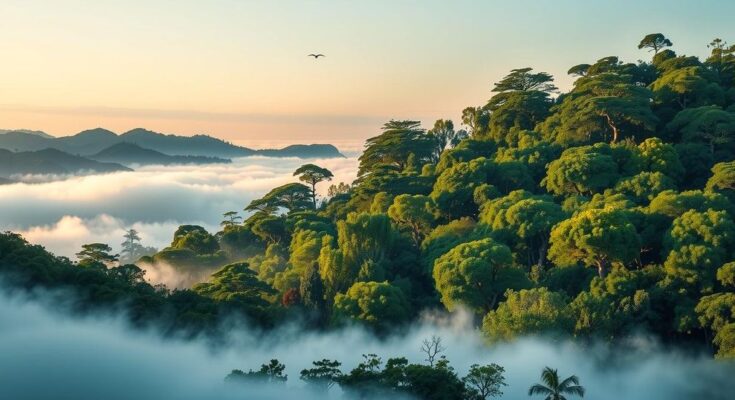Mount Mulanje, a vital ecological site in Malawi, faces severe deforestation and biodiversity loss due to illegal logging and natural disasters like Cyclone Freddy. Conservation initiatives are underway to restore its endemic Mulanje cedar, involving local community participation and sustainable practices to address economic pressures. Efforts focus on reforestation and strengthening local economies while promoting environmental protection beneath escalating climate challenges.
Malawi’s Mount Mulanje, often referred to as the “Island in the Sky,” is a region of remarkable biodiversity and cultural significance. However, it has suffered extensive deforestation over the past decades, particularly affecting its lower miombo woodlands and higher-elevation forests. Efforts to restore the Mulanje cedar, Malawi’s national tree and an endemic species, are underway by the Mulanje Mountain Conservation Trust and various partners.
In March 2023, Tropical Cyclone Freddy caused unprecedented rainfall in Malawi, leading to significant loss of life and displacement. Communities surrounding Mount Mulanje were heavily impacted, with illegal logging and fires exacerbating the situation. The lack of trees intensified the damage from the cyclone, turning slopes into torrents of mud and rock that devastated local agriculture.
Mount Mulanje, covering over 64,000 hectares and featuring 13 peaks, is classified as a UNESCO Biosphere Reserve but faces ongoing biodiversity threats. Many surrounding residents depend on agriculture, cultivating crops like maize and beans, yet the degradation of the miombo woodlands has severely affected their access to wild fruits and water resources.
It has been reported that from 2002 to 2023, nearly 600 hectares of primary forest were lost in the Mulanje Mountain Forest Reserve. Some forest loss may be attributed directly to Cyclone Freddy, but locals face increasing challenges due to economic pressures, leading to tree cutting as a means of survival.
The Mulanje cedar, found only at specific elevations on the mountain, has been critically jeopardized, with detrimental factors including illegal logging and an aphid infestation contributing to its decline. A 2017 survey indicated that only seven live Mulanje cedars were found, with current estimates suggesting none remain in the wild.
Efforts to reestablish this tree species began in 2004, with teams planting thousands of seedlings annually. Recent strategies incorporate community engagement in conservation, such as setting up local nurseries and promoting collaborative fire management. Although challenges remain, including the survival of planted seedlings and enduring threats from fire, conservationists remain committed to these efforts.
Collaboration with local communities extends beyond tree planting to include restoring miombo woodlands and developing sustainable income alternatives. Organizations like WeForest assist communities in natural regeneration and agroforestry projects to confront deforestation caused by charcoal production and other pressures. Quality local products are being developed to help local economies.
The Mulanje Mountain Conservation Trust continues to seek reliable, consistent funding for conservation projects. Efforts are being made to secure public-private partnerships which could enhance the long-term sustainability of conservation efforts on Mount Mulanje, aiming to protect the mountain’s unique biodiversity and ensure the survival of endemic species.
In conclusion, the restoration of Malawi’s Mount Mulanje is crucial not only for conserving biodiversity but also for supporting local communities that rely on its resources. The collaboration between conservation groups and local populations plays a vital role in addressing environmental challenges while fostering sustainable development. Continuous efforts and funding will be integral to reversing the adverse effects of past deforestation and protecting this ecological treasure.
Original Source: news.mongabay.com




